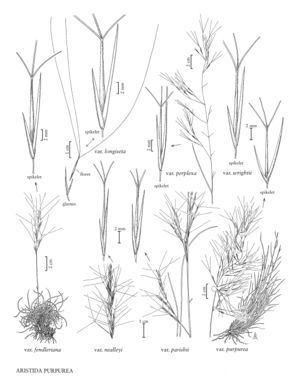Difference between revisions of "Aristida purpurea var. longiseta"
FNA>Volume Importer |
imported>Volume Importer |
||
| (8 intermediate revisions by 2 users not shown) | |||
| Line 7: | Line 7: | ||
|synonyms={{Treatment/ID/Synonym | |synonyms={{Treatment/ID/Synonym | ||
|name=Aristida purpurea var. robusta | |name=Aristida purpurea var. robusta | ||
| − | |authority= | + | |authority= |
| − | }}{{Treatment/ID/Synonym | + | |rank=variety |
| + | }} {{Treatment/ID/Synonym | ||
|name=Aristida longiseta var. robusta | |name=Aristida longiseta var. robusta | ||
| − | |authority= | + | |authority= |
| − | }}{{Treatment/ID/Synonym | + | |rank=variety |
| + | }} {{Treatment/ID/Synonym | ||
|name=Aristida longiseta | |name=Aristida longiseta | ||
| − | |authority= | + | |authority= |
| + | |rank=species | ||
}} | }} | ||
|hierarchy=Poaceae;Poaceae subfam. Aristidoideae;Poaceae tribe Aristideae;Aristida;Aristida purpurea;Aristida purpurea var. longiseta | |hierarchy=Poaceae;Poaceae subfam. Aristidoideae;Poaceae tribe Aristideae;Aristida;Aristida purpurea;Aristida purpurea var. longiseta | ||
| Line 26: | Line 29: | ||
-->{{Treatment/Body | -->{{Treatment/Body | ||
|distribution=Wyo.;Colo.;N.Mex.;Tex.;La.;Utah;Calif.;Minn.;Kans.;N.Dak.;Nebr.;Okla.;S.Dak.;Oreg.;Mont.;Alta.;B.C.;Man.;Sask.;Wash.;Iowa;N.C.;S.C.;Ariz.;Idaho;Nev. | |distribution=Wyo.;Colo.;N.Mex.;Tex.;La.;Utah;Calif.;Minn.;Kans.;N.Dak.;Nebr.;Okla.;S.Dak.;Oreg.;Mont.;Alta.;B.C.;Man.;Sask.;Wash.;Iowa;N.C.;S.C.;Ariz.;Idaho;Nev. | ||
| − | |discussion=<p>Aristida purpurea var. longiseta grows on sandy or rocky slopes and plains, and in barren soils of disturbed ground from western Canada to northern Mexico. It is the most variable variety of Aristida purpurea, ranging from short plants with basal leaves and short panicles suggestive of var. fendleriana, to tall plants with long cauline leaves and long, drooping panicles resembling var. purpurea. The length of its glumes, width of its lemma apex, and the length and thickness of its awns distinguish it from all the other varieties. The callus and long, stiff awns are especially troublesome to sheep and cattle.</p> | + | |discussion=<p><i>Aristida purpurea </i>var.<i> longiseta</i> grows on sandy or rocky slopes and plains, and in barren soils of disturbed ground from western Canada to northern Mexico. It is the most variable variety of <i>Aristida purpurea</i>, ranging from short plants with basal leaves and short panicles suggestive of <i></i>var.<i> fendleriana</i>, to tall plants with long cauline leaves and long, drooping panicles resembling <i></i>var.<i> purpurea</i>. The length of its glumes, width of its lemma apex, and the length and thickness of its awns distinguish it from all the other varieties. The callus and long, stiff awns are especially troublesome to sheep and cattle.</p> |
|tables= | |tables= | ||
|references= | |references= | ||
| Line 35: | Line 38: | ||
-->{{#Taxon: | -->{{#Taxon: | ||
name=Aristida purpurea var. longiseta | name=Aristida purpurea var. longiseta | ||
| − | |||
|authority=(Steud.) Vasey | |authority=(Steud.) Vasey | ||
|rank=variety | |rank=variety | ||
| Line 42: | Line 44: | ||
|basionyms= | |basionyms= | ||
|family=Poaceae | |family=Poaceae | ||
| + | |illustrator=Linda A. Vorobik;Andy Sudkamp | ||
| + | |illustration copyright=Utah State University | ||
|distribution=Wyo.;Colo.;N.Mex.;Tex.;La.;Utah;Calif.;Minn.;Kans.;N.Dak.;Nebr.;Okla.;S.Dak.;Oreg.;Mont.;Alta.;B.C.;Man.;Sask.;Wash.;Iowa;N.C.;S.C.;Ariz.;Idaho;Nev. | |distribution=Wyo.;Colo.;N.Mex.;Tex.;La.;Utah;Calif.;Minn.;Kans.;N.Dak.;Nebr.;Okla.;S.Dak.;Oreg.;Mont.;Alta.;B.C.;Man.;Sask.;Wash.;Iowa;N.C.;S.C.;Ariz.;Idaho;Nev. | ||
|reference=None | |reference=None | ||
| Line 47: | Line 51: | ||
|publication year= | |publication year= | ||
|special status= | |special status= | ||
| − | |source xml=https:// | + | |source xml=https://bitbucket.org/aafc-mbb/fna-data-curation/src/200273ad09963decb8fc72550212de541d86569d/coarse_grained_fna_xml/V25/V25_1012.xml |
|subfamily=Poaceae subfam. Aristidoideae | |subfamily=Poaceae subfam. Aristidoideae | ||
|tribe=Poaceae tribe Aristideae | |tribe=Poaceae tribe Aristideae | ||
Latest revision as of 17:55, 11 May 2021
Culms 10-40(50) cm. Leaves sometimes mostly basal, sometimes mostly cauline; blades 4-16 cm, usually involute. Panicles 5-15 cm; primary branches appressed or ascending at the base, without axillary pulvini, stout and straight to delicate and drooping distally, usually neither flexible nor tangled. Lower glumes 8-12 mm; upper glumes (14)16-25 mm; lemmas 12-16 mm long, apices 0.3-0.8 mm wide; awns subequal, 40-100(140) mm long, 0.2-0.5 mm wide at the base. 2n = 22, 44, 66, 88.
Distribution
Wyo., Colo., N.Mex., Tex., La., Utah, Calif., Minn., Kans., N.Dak., Nebr., Okla., S.Dak., Oreg., Mont., Alta., B.C., Man., Sask., Wash., Iowa, N.C., S.C., Ariz., Idaho, Nev.
Discussion
Aristida purpurea var. longiseta grows on sandy or rocky slopes and plains, and in barren soils of disturbed ground from western Canada to northern Mexico. It is the most variable variety of Aristida purpurea, ranging from short plants with basal leaves and short panicles suggestive of var. fendleriana, to tall plants with long cauline leaves and long, drooping panicles resembling var. purpurea. The length of its glumes, width of its lemma apex, and the length and thickness of its awns distinguish it from all the other varieties. The callus and long, stiff awns are especially troublesome to sheep and cattle.
Selected References
None.
